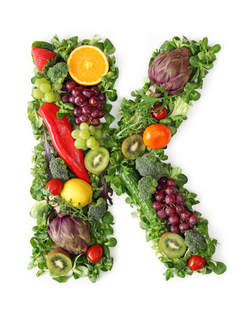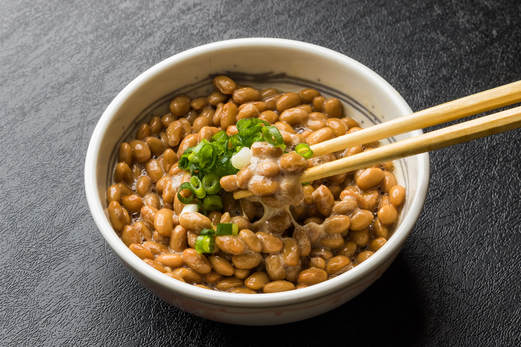|
Vitamin what? K? Yup! Why’d they skip vitamins F, G, H, I & J? Great question! That's because the "K" stands for "koagulation" which is the Danish spelling for "coagulation." Vitamin K is the vitamin that helps the blood to clot or coagulate. And that's just the tip of the iceberg of what this amazing, underappreciated vitamin does for our bodies. It’s one of the four fat-soluble vitamins: Vitamins A, D, E & K. Let me tell you about all those functions this little powerhouse does for us. Then I’ll list out some vitamin-K rich foods. Once you read this post, you can consider yourself officially in the know about this little-known vitamin. Vitamin K’s amazing functions As I mentioned earlier, the “K” stands for the vitamin’s ability to help clot our blood. And this is a critical life-saving measure to prevent blood loss from cuts and scrapes. Vitamin K also works hand-in-hand with calcium in the blood. It helps to shuttle the calcium to our bones and teeth where we need it. This reduces our risk of fractures and cavities. Having too much calcium in our blood can lead to kidney stones and hardened arteries (atherosclerosis), so vitamin K helps to reduce our risks of those too. It also helps with insulin. Not only is vitamin K critical for making insulin, but also to keep your cells sensitive to it. This means that vitamin K can help you better regulate your blood sugar levels. Vitamin K has a few other functions too. It can help to regulate your sex hormones. In men, it helps to maintain good levels of testosterone. In women with PCOS, it helps to reduce certain hormones. Finally, vitamin K can help protect against cancer by switching off cancer genes. It’s a pretty amazing and versatile vitamin. What to eat to get vitamin K There are two main types of vitamin K: K1 and K2. The type depends on which foods you eat. Vitamin K1 is found in plants; while vitamin K2 is found in animal foods and fermented plants. Vitamin K1 supports blood clotting (remember "koagulation?"). Vitamin K1 is found mostly in cruciferous vegetables (e.g., as broccoli, cauliflower, cabbage, and Brussels sprouts), dark leafy greens (e.g., spinach, collard greens, parsley, and Swiss chard), as well as asparagus. Vitamin K2 also supports blood clotting and had additional health benefits. Bone mineralization and effects on cancer genes and sex hormones are primarily from the K2 version. Vitamin K2 is found in egg yolk, cheese, butter, meat, and fermented foods like sauerkraut. Two of the best sources of vitamin K2 are natto (fermented soy) and goose liver. Since vitamin K is one of the four fat-soluble vitamins, it’s best to eat it with a bit of fat. This helps to increase absorption from the food into your body. If you do want to supplement, make sure you follow the label directions. Some of the cautions include the fact that Vitamin K can interact with several types of medications, so make sure it’s right for you before taking it. Vitamins K1 and K2 are essential fat-soluble vitamins. They help our blood to clot, our bones to get strong, and regulate our sex hormones, just to name a few. Vitamin K1 is found in green veggies, like cruciferous and leaves. K2 is found in egg yolks, meat, cheeses, and fermented foods. I hope you now feel like you're in the know about this amazing (but not-so-well-known) vitamin. Did you learn something new? Did you want to add something I missed? Let me know in the comments below. Recipe (Vitamin K2-rich): Natto Ingredients 2 cups dried soybeans, rinsed (choose organic) 6 cups water 1 package natto starter culture (or leftover natto from the last batch) Instructions Soak soybeans overnight in 6 cups of water. Drain soaking water. Place beans in fresh water to boil until soft (up to 9 hours). NOTE: Because we’re going to be fermenting, the recipe from here on needs to use only sterilized equipment and pre-boiled water. Drain soft soybeans and place in a pot with natto starter culture (per directions on the culture package). Gently stir. Place beans/culture mixture in a thin layer in as many casserole dishes or baking trays as necessary. Cover each with sterilized cheesecloth and place the lid on top. Place covered dishes in oven or dehydrator set for 100F for about 24 hours. The culture should eventually grow to look like a white film around the soybeans. Let cool. Remove cheesecloth and refrigerate (or freeze). Serve & enjoy! Tip: If you save some of the natto, you can use it as your starter culture for future batches.
0 Comments
Leave a Reply. |
Archives
November 2022
Categories
All
|


 RSS Feed
RSS Feed